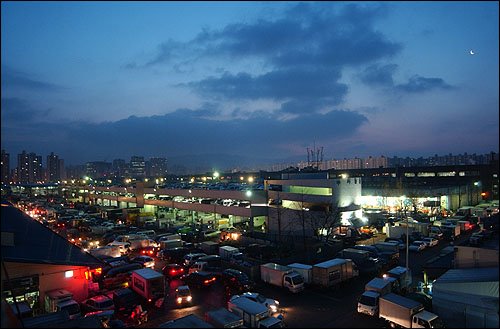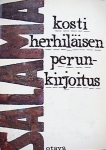(Small businesses/marketplaces) Karaktong wholesale market
"The daybreak people" (새벽 여는 사람들) series in Ohmynews goes this time to the Karak-tong (Garak-dong) wholesale market in southern Seoul. The main character of the article is An Kap-su, who as a child did not want to become like his parents, working at night and not being able to have a family meal together, but who still ended up as a "marketplace man" (as one of the "marketplace people", sijang saram). At first he was becoming like his early deceased father in refreshing his weary body after a day's (or night's) work: alcohol without anju and lots of cigarettes. But becoming a father of two daughters did change him."춥고 힘들 땐 자연스레 술을 찾게 되요. 덩달아 담배도 많이 늘죠. 안주라도 잘 챙겨먹어야 하는데 시장 사람들이 어디 비싼 안주를 먹나요? 어떻게 번 돈인데 그 돈으로 안주를 먹나요. 시장 사람들은 검소해서 그냥 소주 한 병이면 족하죠."  Karak-tong market (picture linked from Ohmynews) ⓒ2004 김진석 The first-generation traders in Karak-tong are on the average 46 years of age, but the average age of the 2nd generation is only 35. The younger generation needs to expand to several items of trade to make ends meet, which means a more intense competition. An tells that the business has only gotten worse during the 13 years he's done the job. (--> The one who meets a keeper of a small business that tells that "business has been only getting better" is indeed a lucky person.) What is also typical of people of small businesses, An continues that there's a whole life to be learned in Karak-tong by working there just one day, giving the sense and purpose to his life this way. Mr An "has not had time to use money, so he is able to save a quite lot in a short time" he has bought a big house in an early age (he's 37 now). Notice the typical Korean characteristics of An's problem: he has been losing contact with friends, because he is busy when they'd have time during the week, and during the weekend he can't request their time because they need to be with their families. Families do not meet together, but male friends with themselves during the week; and since An's working hours are opposite of the others', he is getting estranged. An laments that he's not able to be at home and eat normal meals there: "하루에 한 끼만 집 밥을 먹어요. 어떤 때는 잠자느라 그것마저도 놓쳐 못 먹을 때가 많죠. 차라리 라면 국물에 찬밥을 말아먹을지언정 집 밥이 더 좋아요. 하루에 두 끼를 밖에서 사먹는 것도 보통 곤욕이 아니죠. 매일 비슷한 메뉴로 조미료 잔뜩 들어간 바깥 음식이 어디 집밥에 비할 수 있나요?" More so with children. "아주 가끔은 넥타이 맨 화이트칼라 직장 생활이 궁금하기도 해요. 하지막 막상 또 그 일을 하면 힘든 건 마찬가지겠죠. 그래도 살아보지 못한 삶 혹은 안 해 본 일에 대한 막연한 궁금증 같은 게 있어요." An sometimes wanders what it'd be like to tie a necktie and wear a white shirt to work. (He has worn a necktie twice in his life, when he was interviewed for his short stint in a hotel, and in his wedding.) The man gives a very family-centered impression of himself in the article, which surely would be the impression given by any man, who has a bit of a bad conscience of not being more at home. His dream (kkum) is to take his family to a comfortable vacation (nûgûthan yôhaeng, lit. "trip") somewhere, but for that the economy should get better. --> Here is one marker of the social dinstinctions, the ability to go on vacations. In this case, it's not the question of money but time: no-one will do his work in his absence, and for a keeper of a small business, three-day vacation is already a luxury. "우리도 이리 쪼들리는데 저희 보다 어려운 사람들은 얼마나 힘들겠어요. 경기만 좋아진다면 뭐 특별히 바랄 게 있나요. 힘든 서민들이 잘 살 수 있게 해준다면 더 이상 바랄 것도 없어요." "If the ordinary people (sômin), having a hard time, only could live comfortably." --> Seems that he counts himself as one of the "ordinary people", despite of his apparently ok income. It is his occupation, not being a white collar, which allows him to use this kind of talk. Categories at del.icio.us/hunjang: marketplaces • businesskeepers • seomin |


Comments to note "(Small businesses/marketplaces) Karaktong wholesale market" (Comments to posts older than 14 days are moderated)
Write a Comment